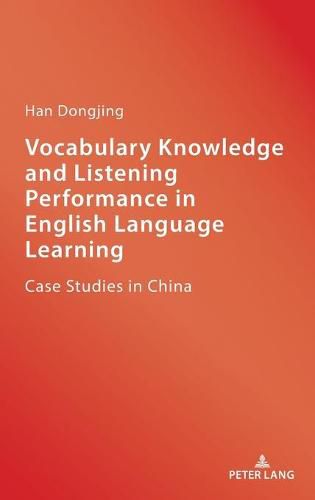Readings Newsletter
Become a Readings Member to make your shopping experience even easier.
Sign in or sign up for free!
You’re not far away from qualifying for FREE standard shipping within Australia
You’ve qualified for FREE standard shipping within Australia
The cart is loading…






This title is printed to order. This book may have been self-published. If so, we cannot guarantee the quality of the content. In the main most books will have gone through the editing process however some may not. We therefore suggest that you be aware of this before ordering this book. If in doubt check either the author or publisher’s details as we are unable to accept any returns unless they are faulty. Please contact us if you have any questions.
The primary aim of this book is to enhance English as a foreign language (EFL) learners’ listening proficiency and provide pedagogical implications for vocabulary and listening teaching practice. This book gives particular attention to mastery of aural vocabulary knowledge to enhancement of listening performance in Chinese context. It provides a comprehensive picture of the role of vocabulary acquisition approaches and strategy practice in listening performance.
This book evaluates the relationship between vocabulary knowledge and listening comprehension in English as a foreign language (EFL), which has not been sufficiently investigated empirically. In particular, it has an added focus on the use of aural vocabulary knowledge tests in detecting the role of vocabulary knowledge in listening comprehension. It highlights the role of vocabulary knowledge in determining listening success. Specifically, it draws scholars’ attention to the contributions of aural vocabulary knowledge to listening comprehension. The study also confirms the previous hypotheses of higher correlations between aural vocabulary size knowledge and listening comprehension. Pedagogically, it confirms the significance and necessity of improving both aural and written forms of vocabulary knowledge and focusing on strategy-embedded listening activities in EFL listening education. In this book, each chapter is dedicated to a specific theme in EFL learning and acquisition, providing a China case study dedicated to further development of EFL education.
$9.00 standard shipping within Australia
FREE standard shipping within Australia for orders over $100.00
Express & International shipping calculated at checkout
This title is printed to order. This book may have been self-published. If so, we cannot guarantee the quality of the content. In the main most books will have gone through the editing process however some may not. We therefore suggest that you be aware of this before ordering this book. If in doubt check either the author or publisher’s details as we are unable to accept any returns unless they are faulty. Please contact us if you have any questions.
The primary aim of this book is to enhance English as a foreign language (EFL) learners’ listening proficiency and provide pedagogical implications for vocabulary and listening teaching practice. This book gives particular attention to mastery of aural vocabulary knowledge to enhancement of listening performance in Chinese context. It provides a comprehensive picture of the role of vocabulary acquisition approaches and strategy practice in listening performance.
This book evaluates the relationship between vocabulary knowledge and listening comprehension in English as a foreign language (EFL), which has not been sufficiently investigated empirically. In particular, it has an added focus on the use of aural vocabulary knowledge tests in detecting the role of vocabulary knowledge in listening comprehension. It highlights the role of vocabulary knowledge in determining listening success. Specifically, it draws scholars’ attention to the contributions of aural vocabulary knowledge to listening comprehension. The study also confirms the previous hypotheses of higher correlations between aural vocabulary size knowledge and listening comprehension. Pedagogically, it confirms the significance and necessity of improving both aural and written forms of vocabulary knowledge and focusing on strategy-embedded listening activities in EFL listening education. In this book, each chapter is dedicated to a specific theme in EFL learning and acquisition, providing a China case study dedicated to further development of EFL education.